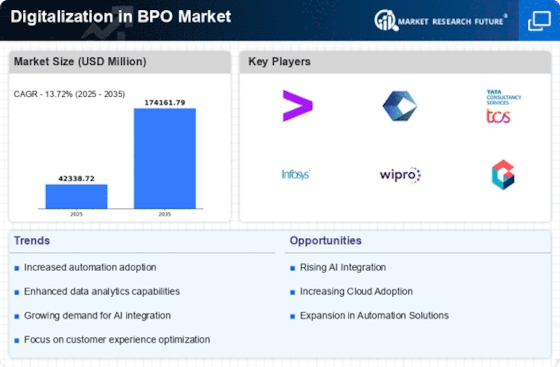Market Share
Digitalization in BPO Market Share Analysis
In the dynamic landscape of the Business Process Outsourcing (BPO) market, digitalization has emerged as a pivotal force reshaping strategies and market shares. Digitalization in BPO refers to the integration of advanced technologies like automation, artificial intelligence, and analytics to streamline processes, enhance efficiency, and deliver superior services to clients. Within this evolving environment, companies adopt various market share positioning strategies to establish their presence and gain a competitive edge.
One prevalent strategy is differentiation, where BPO firms leverage digitalization to offer unique value propositions that set them apart from competitors. For instance, companies may develop specialized expertise in niche sectors such as healthcare or finance, integrating digital tools tailored to the specific needs of these industries. By positioning themselves as experts in these domains, they attract clients seeking tailored solutions, thereby capturing market share in targeted segments.
Another strategy involves cost leadership, wherein BPO firms utilize digitalization to drive operational efficiencies and reduce costs. Automation technologies, for example, enable companies to streamline repetitive tasks, minimize errors, and accelerate processes, ultimately leading to cost savings. By passing these benefits onto clients in the form of competitive pricing, BPO providers can attract cost-conscious businesses and gain market share by offering affordable yet quality services.
Furthermore, some companies opt for a focused differentiation approach, concentrating on a narrow market segment and customizing digital solutions to meet the unique requirements of that segment. This strategy allows BPO firms to deeply understand the needs of their target audience and tailor their offerings accordingly, thereby gaining a competitive advantage. For instance, a BPO provider might focus exclusively on small and medium-sized enterprises (SMEs), offering scalable digital solutions that cater to their specific scale and budget constraints.
Additionally, companies may pursue a strategy of innovation, continuously investing in research and development to pioneer new digital solutions that disrupt the market. By staying at the forefront of technological advancements, these firms attract forward-thinking clients seeking cutting-edge BPO services. Moreover, by establishing themselves as innovators, they enhance their brand reputation and credibility, further solidifying their market share.
Collaboration is another strategy increasingly adopted in the digitalized BPO market, where firms partner with technology providers or other BPO companies to leverage complementary strengths and expand their service offerings. Through strategic alliances, BPO firms can access additional resources, expertise, and technologies, enabling them to deliver more comprehensive solutions to clients and capture a larger share of the market.
Moreover, customer-centricity is essential in market share positioning strategies, as BPO firms prioritize understanding and fulfilling the evolving needs and preferences of their clients. Digitalization facilitates enhanced customer engagement and satisfaction through personalized services, real-time analytics, and seamless communication channels. By consistently delivering value and exceeding client expectations, BPO providers can build long-term relationships, foster loyalty, and ultimately expand their market share.


















Leave a Comment